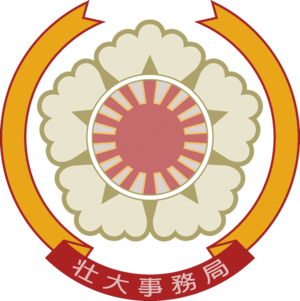Grand Secretariat
The Chidao Emperor Imperial Household | Imperial Stewardship Teachings of the Empire
Ministries & Secretariats: Ministry of Truth | Ministry of Purity | Ministry of Stability Chao Suweiai formerly known as National Diet Defunct:
Political Factions: Guanchang | Kantai-ha (Navy) | Gunbatsu (Army) | Shanghu (Traders) Defunct: Other institutions Tianchao Chuandui | Imperial Armed Forces | Young Wandering Society | Tegong |
The Grand Secretariat is the executive power of the Jingdaoese Empire. It is headed by the Emperor and composed of the Diwang and the Ministers. It's without doubt the most important institution within the Empire: centralising power within the hands of a small amount of individuals, who aid the Heavenly Light. The three Great Ministries - whom are divided into several Secretariats - are responsible for the administration. All three have their main office at Sheng Garden in Daocheng, but several minor branches are spread throughout the capital city.
Composition
Before the Xianfa Constitution, the Diwang was appointed by the Emperor (during the Minshu Period this was a representative from the largest party in the Imperial Assembly), who had to find a majority which supported his cabinet. Once a majority was reached, the parties delivered Ministers.
While the Emperor normally did not interfere in its daily affairs, the Grand Secretariat depended of his goodwill to pass Decrees. The Diwang acted as the head of government, while the Emperor as head of state did not hold any responsibility.
The Xianfa Constitution introduced certain changes: the Diwang still led the government but was no longer dependable for support from the Emperor. Instead, he was directly elected. His Ministers, however, needed the support of the Imperial Yuan. Those democratic reforms did not take long to see their end: the elected Chiang Shun was replaced by Zhang San in 1650 AN. Other policies were reverted when the Meiyo Emperor, under immense pressure from both political and military factions, was more or less forced to step down in favour of the child of the former Hai Emperor. The breakdown of political order in the aftermath of the War of Lost Brothers had not only meant the resolute end of Her reign, but had weakened the constitutional parties tremendously. The new advisors of the Chidao Emperor - merely a child when ascending the Heavenly Throne - further ignored the constitution and any accountability to anything else than the Emperor himself was ignored and eventually scratched from the lawbooks.
Ministries
- Ministry of Truth
- Secretariat of Rites
- Secretariat of Propaganda
- Secretariat of Education
- Secretariat of Censor
- Ministry of Purity
- Secretariat of Revenue
- Secretariat of Immigration
- Secretariat of Appointments
- Ministry of World Peace
- Secretariat of Slaying
- Secretariat of Sinking
- Secretariat of Hanging
- Secretariat of Talking

